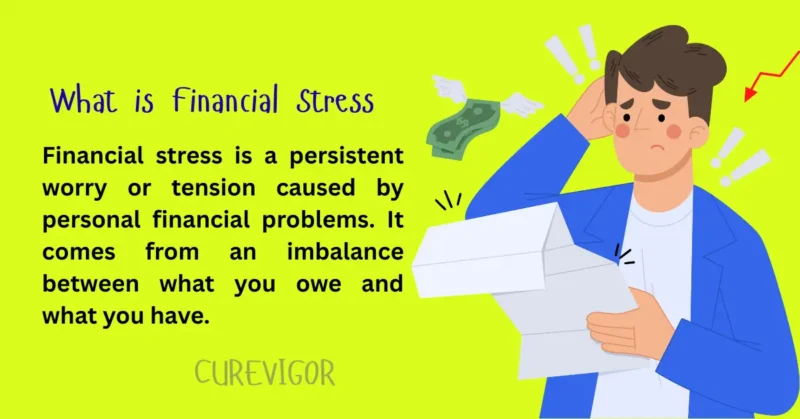Tired of Financial Stress keeping you awake? Discover our powerful 5-step plan to break the anxiety cycle, regain control of your money, and unlock deeper sleep and better health for good.
Thank you for reading this post, don't forget to subscribe!Confidently reduce financial stress for better sleep & health. Discover actionable tips to manage money worries, improve sleep quality, and boost your overall well-being. Start feeling better today!
Losing sleep over bills and budgets? You’re not alone. Financial stress is a silent epidemic that steals our sleep, sabotages our focus, and can even weaken our immune system. But what if you could transform that anxiety into actionable steps for a calmer mind and a healthier body?
How to Confidently Reduce Financial Stress for Better Sleep and Health
This guide moves beyond generic advice to give you a confident, practical roadmap for reducing financial worry. Discover how to create a manageable plan, cultivate a positive money mindset, and finally achieve the restful sleep and vibrant health you deserve—because true wealth is waking up feeling truly well.
Take your first step today and start applying these strategies for real change. Start today by reading on and putting one recommendation into action.
What is Financial Stress?
Financial stress is a persistent worry or tension caused by personal financial problems. It comes from an imbalance between what you owe and what you have.
It’s more than a fleeting worry about one bill. Financial stress is a lasting unease that can take over your thoughts and make solutions seem distant. It brings a sense of lost control over money and threatens your sense of security.

Key Characteristics & Sources:
Financial stress typically stems from several core sources:
- Income Instability: Worrying about job security, irregular income (e.g., from freelancing or commissions), or a lack of income.
- Overwhelming Debt: The pressure of managing high-interest debt from credit cards, student loans, personal loans, or mortgages.
- Insufficient Savings: The anxiety of not having an emergency fund for unexpected expenses (like a car repair or medical bill) or not saving enough for retirement.
- Living Paycheck to Paycheck: The constant pressure of covering basic living expenses like rent, groceries, and utilities with no financial cushion.
- Major Life Events: Stress triggered by significant financial demands, such as paying for a wedding, a child’s education, or medical care.
How It Manifests: Beyond Your Bank Account
Financial stress does not just affect your wallet. Its negative impact spreads into all areas of your well-being:
- Mental & Emotional:
- Anxiety and Constant Worry: A relentless loop of thoughts about money.
- Feelings of Helplessness or Shame: Believing your situation is your fault and that you can’t fix it.
- Irritability and Mood Swings: Taking financial frustration out on partners, family, or friends.
- Difficulty Concentrating: Money worries make it hard to focus at work or school.
- Physical:
- Sleep Problems: Insomnia or restless sleep due to a racing mind.
- Fatigue and Low Energy: The mental burden is physically draining.
- Headaches, Muscle Tension, and Stomach Issues: The body’s physical response to chronic stress.
- Weakened Immune System: Making you more susceptible to getting sick.
- Behavioral:
- Withdrawal from Social Activities: Avoiding friends and events because you can’t afford to participate.
- Arguments with Family: Money is a leading cause of conflict in relationships.
- Unhealthy Coping Mechanisms: Some may turn to overeating, excessive drinking, or other habits to numb the anxiety.
In short, financial stress is a heavy burden on your mind, body, and relationships. This makes it hard to break the cycle and make clear decisions. Recognizing it is the first step to managing it.
How to Reclaim Your Peace of Mind
Money worries can be a silent thief of joy. They creep into our thoughts during the day and buzz in our heads at night. These worries subtly, yet powerfully, impact nearly every aspect of our lives. This isn’t just about balancing your budget. It’s about the hidden cost of money worries on your peace of mind, your relationships, and ultimately, your health.
You know that feeling when financial strain keeps you tossing and turning? That’s the link between money trouble, sleep, and well-being. Here’s the good news: you don’t have to stay stuck in that cycle.
In this post, you’ll learn three key takeaways: how to identify financial stress, steps to manage it, and how this leads to better sleep and greater overall happiness. It’s time to take charge!
The Vicious Cycle: How Financial Stress Damages Your Health

It might sound dramatic, but financial stress can really feel like a monster under the bed when it messes with your sleep. Impact on sleep is often one of the first and most frustrating symptoms. You find yourself wide awake at 3 AM, mind racing through bills, budgets, and what-ifs. This isn’t just worrying—it’s financial anxiety and insomnia keeping you from the rest you need.
The science is clear: stress triggers hormones like cortisol. These hormones help you fight a bear, but hurt your ability to unwind. Disrupted sleep creates a vicious cycle. The less you sleep, the harder it is to think clearly, make good decisions, and manage your money. Poor sleep also worsens financial choices over time.
But it’s not just your sleep. Constant worry takes a real toll on physical health. You might get frequent headaches or an upset stomach. You may even get sick more often because stress weakens your immune system.
These are all physical symptoms of anxiety. In time, financial stress can increase your risk of chronic conditions like high blood pressure, heart disease, and even contribute to obesity.
And let’s not forget the effects on your mental and emotional well-being. Persistent worry can lead to anxiety and depression, making daily tasks feel overwhelming. It causes decreased focus and productivity, whether at work or at home.
This makes it harder to improve your finances. It can also strain relationships, as arguments about money become more frequent, or you withdraw from loved ones due to shame or stress. Awareness is the first step to lifting this heavy burden.
Taking Control: Actionable Steps to Financial Confidence
Ready to break free from the cycle? The key is Gaining Clarity, understanding Your Financial Picture. Think of it as mapping out your personal financial landscape. Start by Creating a Realistic Budget. This isn’t about deprivation; it’s your roadmap for managing income and expenses, ensuring your money works for you. Tools like budgeting apps or even a simple spreadsheet can make this less intimidating.
Next, be honest with yourself by tracking your spending. You might be surprised where your money actually goes! This helps you spot areas for savings and make conscious choices. Maybe that daily latte adds up to a weekend getaway—just knowing gives you power. Finally, know your debts. List them, understand the interest rates, and start prioritizing debt repayment. Even tackling the smallest debt first can give you a motivational boost.
Once you have clarity, start building your financial safety net. An emergency fund is crucial. It’s your buffer against car repairs or medical bills. This fund reduces anxiety. Set achievable financial goals, whether it’s saving for a down payment or a vacation. Small, consistent steps lead to security. Consider automating savings and costs. Use direct deposits or automatic bill pay. This simplifies your finances and reduces mental load.
To truly master your money, build smart money habits for long-term wellness. Increase your financial literacy by reading blogs, listening to podcasts, and learning about investments and planning. You don’t need to be an expert—a solid understanding is empowering.
Practice mindful spending. Learn to distinguish between needs and wants to reduce impulse buys. Before buying, ask yourself: “Do I need this, or is it just a temporary fix for stress?” Lastly, seek professional help when needed. A financial advisor can suggest strategies, and a debt counselor can help you manage overwhelming debt.
Cultivating Calm: Improving Sleep and Health Amidst Financial Realities
Even as you tackle your finances, it’s vital to create a space for calm, especially when it comes to sleep. Start by Optimizing Your Sleep Environment.
- Creating a Sleep Sanctuary: Your bedroom should be for rest, not a second office or a place to scroll through social media. Keep it dark, quiet, and calm.
- Digital Detox Before Bed: The blue light from screens interferes with melatonin, the hormone that helps you sleep. Aim to put away phones, tablets, and laptops at least an hour before bed.
- Consistent Sleep Schedule: Going to bed and waking up around the same time each day, even on weekends, helps retrain your body’s internal clock for more restful nights. Key takeaway: Regular sleep routines make quality sleep easier and more reliable.
Alongside creating a better sleep environment, embrace Stress Management Techniques for Daily Relief.
Techniques for Daily Relief.
- Mindfulness and Meditation: Even 5-10 minutes of guided meditation or focused breathing can calm a racing mind, preparing you for sleep.
- Deep Breathing Exercises: Simple techniques, like the 4-7-8 breathing method, can reduce immediate stress and help you relax when worries start to surface.
- Regular physical activity is a fantastic stress reliever and sleep aid. Exercise improves mood and sleep quality. Just be careful not to work out too close to bedtime, as it can be stimulating.
Finally, remember to nourish your Body and Mind.
- Balanced Diet: Fueling your body with whole, nutritious foods gives it the energy and resilience needed to combat stress.
- Limiting Stimulants: Cut down on caffeine and alcohol, especially in the evening. While they help you relax initially, they often disrupt sleep quality later.
- Connecting with Support Systems: Don’t go it alone. The power of sharing your worries with trusted friends, family, or a support group can provide immense relief and perspective.
Sustaining Your Journey: Long-Term Financial Wellness for Enduring Health
This isn’t a quick fix; it’s a journey. On this path, remember to keep Celebrating Small Victories. Did you stick to your budget for a week? Did you pay off a small debt? Acknowledge these steps on your financial and health journey – they build momentum and confidence.
You’re also building resilience by developing tools for future financial challenges. Life will always bring surprises, but now you’ll have ways to handle them without falling back into stress. This creates a loop of well-being where financial health, better sleep, and overall health reinforce each other. The more financially secure you feel, the better you sleep. The better you sleep, the healthier you are. The healthier you are, the better you can manage your finances. It’s a beautiful, upward spiral!
Conclusion: Embrace Your Confident, Stress-Reduced Future
You’ve got this! We’ve covered the transformative power of taking control of your finances, understanding how it directly impacts your sleep and overall health. With the practical steps for budgeting, saving, debt management, and self-care, you now have the tools to achieve better sleep and health. Key takeaway: Using these steps consistently creates real, lasting change in stress and health.
This isn’t about perfection; it’s about progress. Take your first step now to reclaim calm, sleep better, and boost your well-being. Start today—your confident, healthier self is waiting! Key takeaway: Each small action now leads to bigger improvements over time.
Read more articles about Health & Wellness Tips.
You might like to read:

